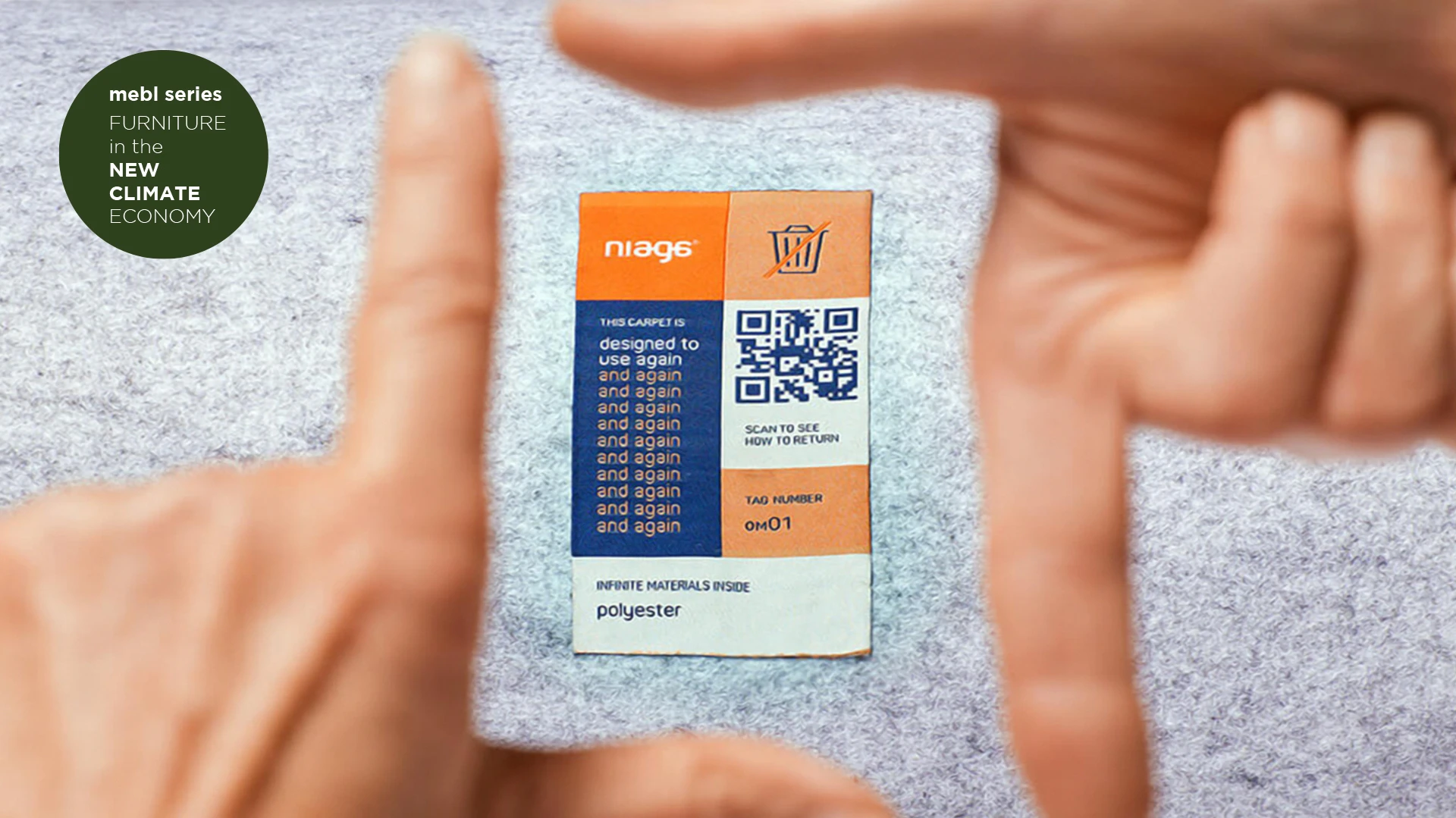
Climate Activist Consumers Business responds
18-Apr-2023
Photo credit: Niaga's product passport tag
Welcome to our second article in the series, FURNITURE in the NEW CLIMATE ECONOMY.
Climate has become more unpredictable, disrupting access to fuel, food, and water and ultimately running the risk of threatening our existence. If, 20 years ago, concerns around plastic waste or air travel emissions might have been considered radical, today they are, for most, mainstream sentiments.
More consumers than ever have started questioning over-consumption. Across the globe, according to Capgemini Research Institute, 79% of consumers are changing their purchasing patterns to reflect environmental, social responsibility and inclusiveness criteria. *
The same research shows that – while 56% of global consumers believe business leaders are purposely trying to mislead them – over half of consumers in 16 countries feel they have the collective power to help halt climate change by consuming less and consuming more consciously. This helps them gain a sense of control amid climate uncertainty. *
In this article, the second in our series FURNITURE in the NEW CLIMATE ECONOMY, we explore how businesses across the furniture industry are using innovation to tap into climate-activist consumer behavior and trends. We’ll take a deep dive into a handful of categories of innovation, which reflect three climate-forward principles for brands from the Shelton Group:
- make it easy to make climate-inspired purchasing decisions, with every product on the shelf better for the planet – and encouraging consumers to select those products;
- educate people across the country to understand what it means to tackle climate change, bringing consumers along in the fight; and
- clearly state company commitments to addressing climate change, and find innovative ways to reach out to climate activist consumers.
Please let us know what you’re doing, at [email protected]. We promise to reply!
/ PRIORITIZING TRANSPARENCY over GREENWASHING
Greenwashing leads consumers toward unwittingly becoming part of the problem in fighting climate change. It often misleads them to choose, use or dispose of a product in a counter-productive way.
On the flip, authentic transparency is crucial in communicating a company’s climate commitments. These furniture industry brands exemplify growing efforts to help consumers – quickly and readily – to get the information they need to make sustainable sourcing and purchasing decisions:
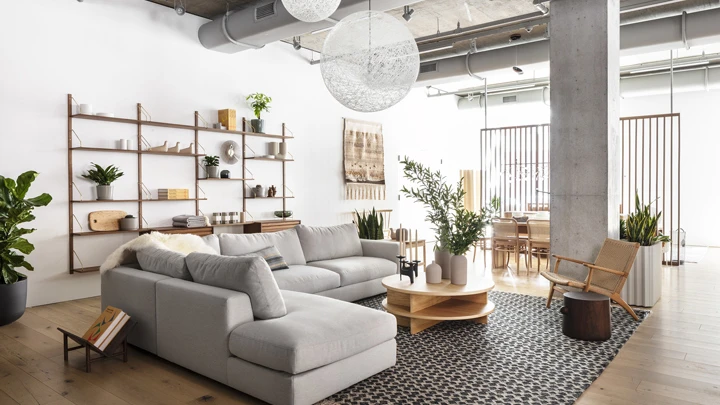

Herman Miller and Knoll offer online platforms for access to environmental product and impact information.
Herman Miller and Knoll, for example, recently joined forces on a combined online platform through which customers can readily access environmental products and impact information in 5 categories: climate health, human health, ecosystem health, circular economy, and social health & equity.
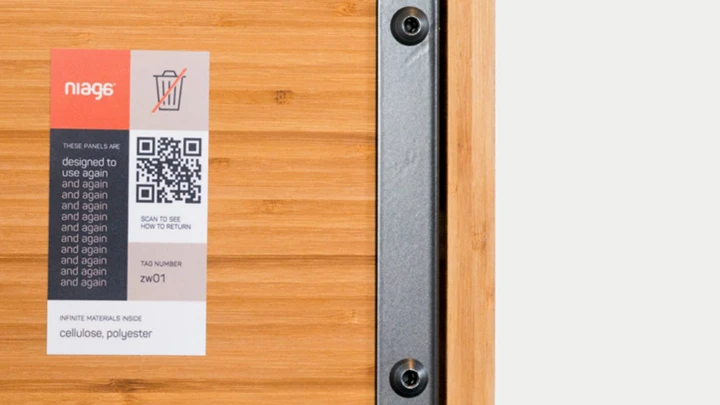
All Niaga products are recycled back, and come complete with a product passport tag.
Niaga, a Dutch company producing furniture panels and mattresses, uses a ‘product passport tag’ to support its claim that all its products are recycled back. Consumers can scan the tag to check the materials and components in any product, while receiving instructions on returns to ‘close the loop.’

Goldfinger uses only recycled or sustainably sourced wood; some of its products are even stamped with the trees' GPS coordinates.
Goldfinger – a London-based bespoke furniture maker – uses only recycled or sustainably sourced wood from trees that fell due to weather or urban development. Some of their furniture pieces are even stamped with trees' GPS coordinates, keeping customers connected to the source materials’ history. Goldfinger’s website also welcomes surplus material donations.
Floyd and Goodee share a commitment to environment and community by publishing impact reports detailing company goals, progress, and certifications. Floyd is an American furniture maker, while Goodee offers a curated marketplace for furniture.
/ REIMAGINING SERVICES & CIRCULAR PROGRAMS
Companies are reimagining business models in response to customers' evolving views of climate change. Through take-back programs, refurbishment, resale, charity donations and rental services, businesses are now helping consumers extend the lifecycle of their furniture, as well as reduce its carbon footprint and waste factor. The latest research from KTH Institute of Technology, in Sweden, indicates that reusing furniture results in an approx. 42% reduction in climate impacts, depending on the characteristics of the second-hand trade. *
Sabai Design, for example, was the first to launch a furniture buyback program in the U.S. This allows consumers to trade-in their used Sabai furniture, while also enabling Sabai to launch a secondhand marketplace. In addition, Sabai offers Repair Don't Replace, a service to refresh clients' furniture with small fixes or component replacement.
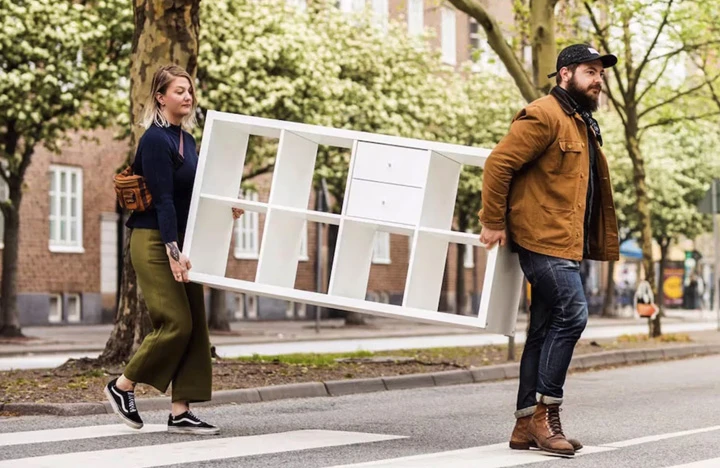
Ikea’s Buy Back & Resell program.
In 2021, IKEA launched its Buy Back & Resell program in the U.S., currently available in more than 40 stores.. Customers ‘sell back’ used IKEA furniture in exchange for IKEA store credit.
NORNORM is a Dutch company that offers a subscription-based furnishing model for business offices. Clients subscribe instead of buying, and when they no longer need the furniture, NORNORM takes it back to refurbish and reuse.
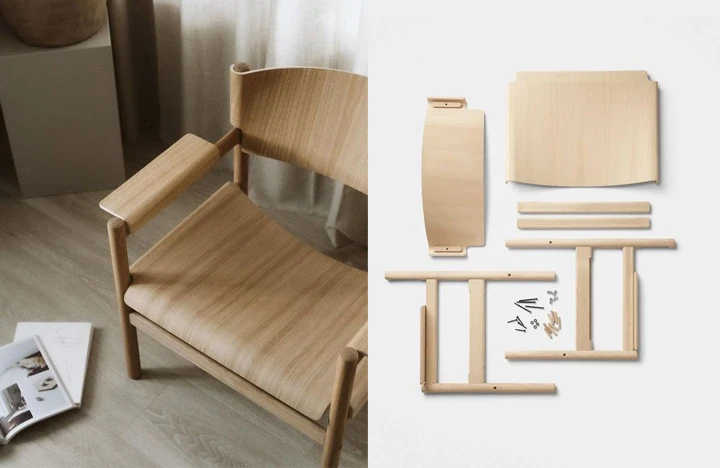
TAKT offers a send-back program.
TAKT, a Danish furniture maker, offers a send-back program through which customers can return used furniture to be refurbished, re-purposed or donated to charitable enterprises. If furniture pieces are in truly poor shape, all materials are recycled in accordance with best practices.
/ CREATING MARKETPLACES & COMMUNITIES
On-line marketplaces promote sustainability by fostering a community for sharing, donating and exchanging goods. This helps climate-conscious consumers live out their values and avoid overconsumption. In addition, these marketplaces can help users connect with peers with shared values to take action together.
AptDeco is a marketplace and community for buying and selling second-hand furniture across the United States. The company’s website notes that their combined business and community impact results in the equivalent to 15,179,491 lbs of CO2 offset, 5,517,607 cars removed and 1,203,806 trees planted. They also detail the amount of CO2 buyers can save by shopping used or selling their furniture.
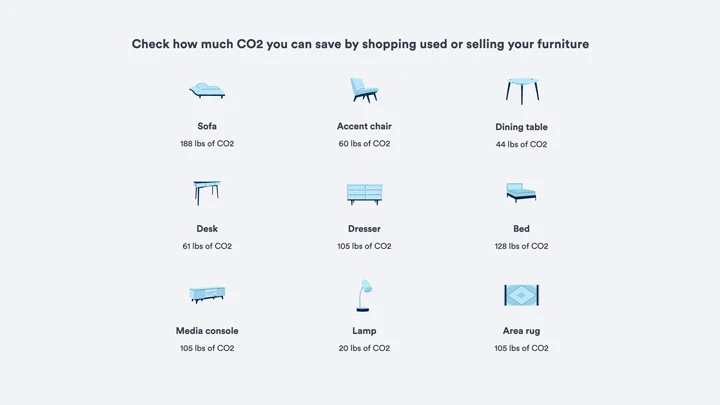
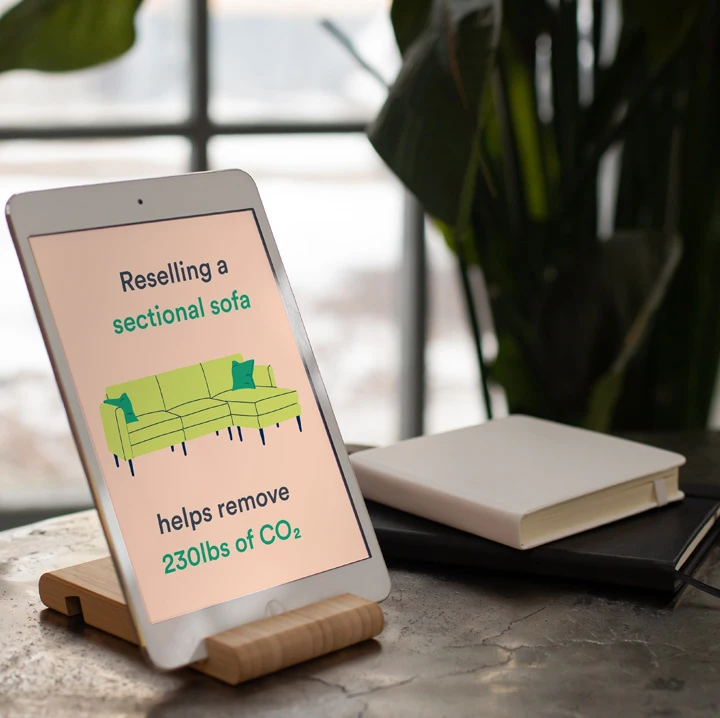
AptDeco is a marketplace and community for buying and selling second-hand furniture across the United States.
Another innovative marketplace is GOODEE, which prioritizes sustainability and environmental impact. GOODEE allows buyers to select furniture by cause,’ such as carbon reduction, recycling, gender advocacy or supporting marginalized communities.
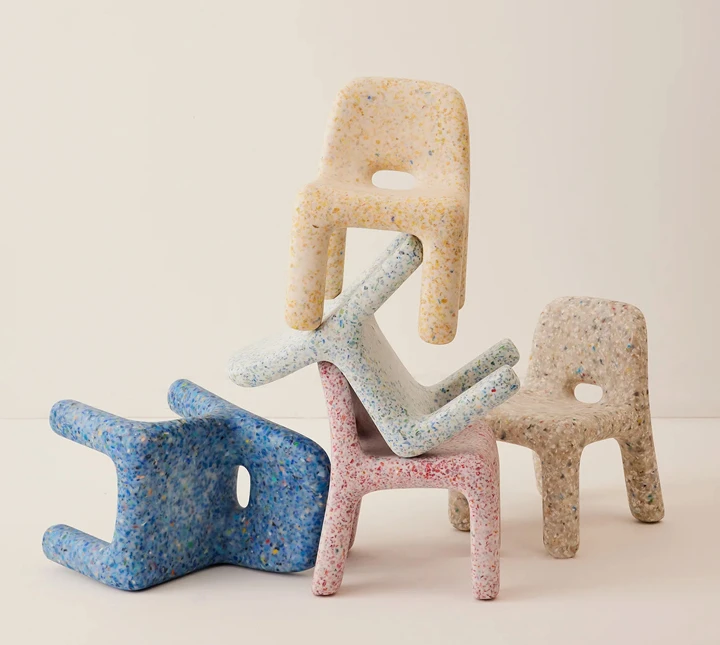
Charlie Chair, by Ecobirdy and available for purchase at GOODEE, is made of ecothylene, Ecobirdy’s patented material from upcycled plastic toys.
Green Standards is a global platform that connects large corporations to non-profits and community organizations. When a major corporation moves or renovates, Green Standards can help donate their surplus furniture and equipment.
/ ENCOURAGING CARE
Companies are creating new ways to encourage and help customers care for products and make them last longer. Proper usage and maintenance are vital for getting the most out of valuable resources. The longer the life of a piece of furniture, the more its environmental impact is reduced. Research shows that repairing a product decreases GHG emissions by about 97% compared to the climate impact of buying new (the exact percentage may vary depending on the specific product and repair scenario). *
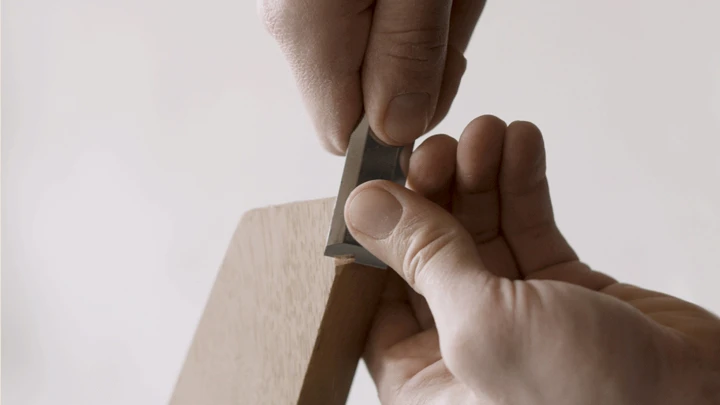
Zeitraum offers furniture repairs.
Zeitraum, a German furniture maker, has always offered to rework, renew or repair what it sells. Each piece of furniture comes with a care & repair kit and instructions on making easy repairs.
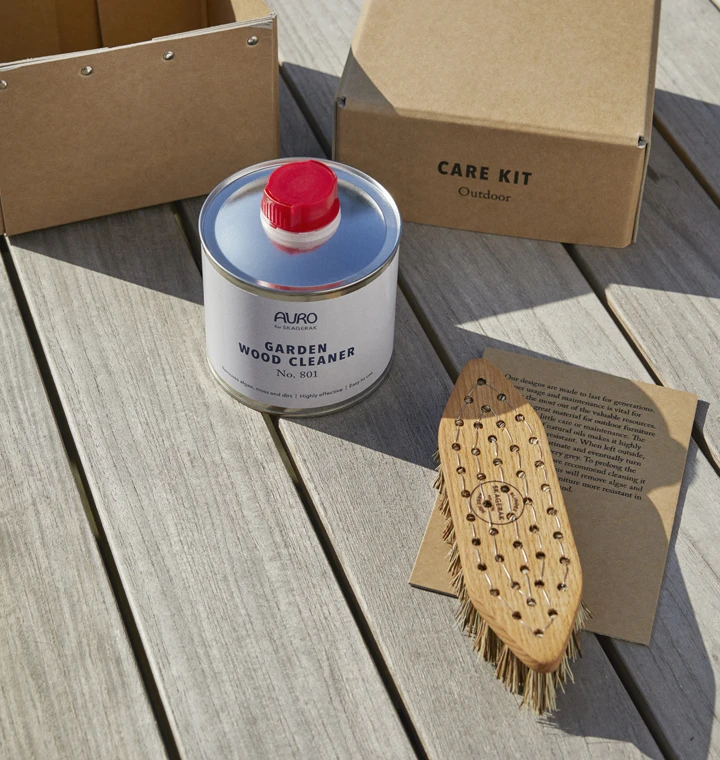
Skagerak provides detailed, compelling material guides.
Indoor and outdoor furniture maker Skagerak provides detailed, compelling material guides to help consumers maintain, repair and prolong the lifetime of their furniture.
Takt's care kits help clients refresh furniture surfaces. The company also offers spare components and recycling & disassembly guidelines that facilitate repairing and moving instead of discarding used furniture.
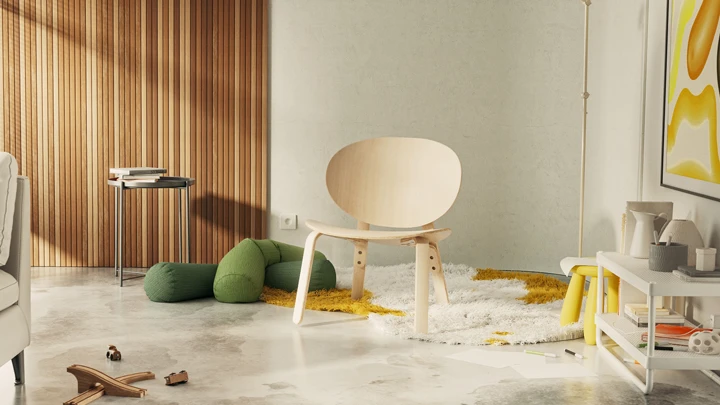
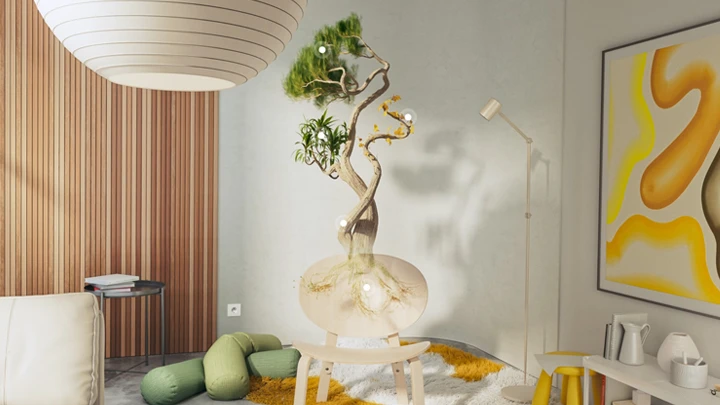
Carbon Banks is a speculative project by Space10 in collaboration with IKEA.
Finally - into innovation? Wrap your head around this ! Space10 is a Copenhagen-based research and design lab that works with IKEA. They propose linking NFTs (non-fungible tokens) to furniture to encourage better care. The lab's speculative project, Carbon Banks, connects a physical IKEA chair to an ever-evolving NFT.
The tree grows lusher the longer a person keeps the chair, and it also responds when the chair is repaired, resold or traded for another item of furniture. Owners can view their virtual tree in AR, following up on its growth — and sharing it with peers. Scanning the tree trunk reveals the chair's metadata: origin, materials, and energy consumption during manufacturing. At the end of its life, the chair can be recycled to trigger a final all-over blooming of flowers.
Tell us what you’re doing – your climate/consumer strategies, steps and inspiration! Email us at [email protected]. We promise to reply. How are you helping expand opportunities for consumers to ‘vote their furniture dollars’ — and, in doing so, strengthen their sense of purpose and control regarding climate change?
READ the other articles in the FURNITURE in the NEW CLIMATE ECONOMY series.
* Sources:
How sustainability is fundamentally changing consumer preferences .... https://www.capgemini.com/insights/research-library/how-sustainability-is-fundamentally-changing-consumer-preferences/
How sustainability is fundamentally changing consumer preferences .... https://www.capgemini.com/insights/research-library/how-sustainability-is-fundamentally-changing-consumer-preferences/
Lexén, K., Kruse, K., Andréason, J. & Rönnblom, A. 2021. Andra Hand I Forsta Hand Klar. Environmental cost, furniture and home furnishings. Stockholm, Sweden: Nature Conservation Society.
Lexén, K., Kruse, K., Andréason, J. & Rönnblom, A. 2021. Andra Hand I Forsta Hand Klar. Environmental cost, furniture and home furnishings. Stockholm, Sweden: Nature Conservation Society.
